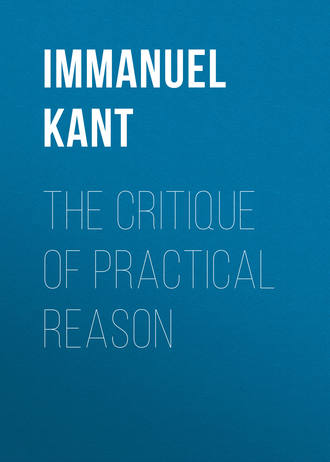 полная версия
полная версияThe Critique of Practical Reason
Now it is clear from the Analytic that the maxims of virtue and those of private happiness are quite heterogeneous as to their supreme practical principle, and, although they belong to one summum bonum which together they make possible, yet they are so far from coinciding that they restrict and check one another very much in the same subject. Thus the question: "How is the summum bonum practically possible?" still remains an unsolved problem, notwithstanding all the attempts at coalition that have hitherto been made. The Analytic has, however, shown what it is that makes the problem difficult to solve; namely, that happiness and morality are two specifically distinct elements of the summum bonum and, therefore, their combination cannot be analytically cognised (as if the man that seeks his own happiness should find by mere analysis of his conception that in so acting he is virtuous, or as if the man that follows virtue should in the consciousness of such conduct find that he is already happy ipso facto), but must be a synthesis of concepts. Now since this combination is recognised as a priori, and therefore as practically necessary, and consequently not as derived from experience, so that the possibility of the summum bonum does not rest on any empirical principle, it follows that the deduction [legitimation] of this concept must be transcendental. It is a priori (morally) necessary to produce the summum bonum by freedom of will: therefore the condition of its possibility must rest solely on a priori principles of cognition.
I. The Antinomy of Practical Reason.
{BOOK_2|CHAPTER_2 ^paragraph 10}
In the summum bonum which is practical for us, i.e., to be realized by our will, virtue and happiness are thought as necessarily combined, so that the one cannot be assumed by pure practical reason without the other also being attached to it. Now this combination (like every other) is either analytical or synthetical. It has been shown that it cannot be analytical; it must then be synthetical and, more particularly, must be conceived as the connection of cause and effect, since it concerns a practical good, i.e., one that is possible by means of action; consequently either the desire of happiness must be the motive to maxims of virtue, or the maxim of virtue must be the efficient cause of happiness. The first is absolutely impossible, because (as was proved in the Analytic) maxims which place the determining principle of the will in the desire of personal happiness are not moral at all, and no virtue can be founded on them. But the second is also impossible, because the practical connection of causes and effects in the world, as the result of the determination of the will, does not depend upon the moral dispositions of the will, but on the knowledge of the laws of nature and the physical power to use them for one's purposes; consequently we cannot expect in the world by the most punctilious observance of the moral laws any necessary connection of happiness with virtue adequate to the summum bonum. Now, as the promotion of this summum bonum, the conception of which contains this connection, is a priori a necessary object of our will and inseparably attached to the moral law, the impossibility of the former must prove the falsity of the latter. If then the supreme good is not possible by practical rules, then the moral law also which commands us to promote it is directed to vain imaginary ends and must consequently be false.
II. Critical Solution of the Antinomy of Practical Reason.
The antinomy of pure speculative reason exhibits a similar conflict between freedom and physical necessity in the causality of events in the world. It was solved by showing that there is no real contradiction when the events and even the world in which they occur are regarded (as they ought to be) merely as appearances; since one and the same acting being, as an appearance (even to his own inner sense), has a causality in the world of sense that always conforms to the mechanism of nature, but with respect to the same events, so far as the acting person regards himself at the same time as a noumenon (as pure intelligence in an existence not dependent on the condition of time), he can contain a principle by which that causality acting according to laws of nature is determined, but which is itself free from all laws of nature.
{BOOK_2|CHAPTER_2 ^paragraph 15}
It is just the same with the foregoing antinomy of pure practical reason. The first of the two propositions, "That the endeavour after happiness produces a virtuous mind," is absolutely false; but the second, "That a virtuous mind necessarily produces happiness," is not absolutely false, but only in so far as virtue is considered as a form of causality in the sensible world, and consequently only if I suppose existence in it to be the only sort of existence of a rational being; it is then only conditionally false. But as I am not only justified in thinking that I exist also as a noumenon in a world of the understanding, but even have in the moral law a purely intellectual determining principle of my causality (in the sensible world), it is not impossible that morality of mind should have a connection as cause with happiness (as an effect in the sensible world) if not immediate yet mediate (viz., through an intelligent author of nature), and moreover necessary; while in a system of nature which is merely an object of the senses, this combination could never occur except contingently and, therefore, could not suffice for the summum bonum.
Thus, notwithstanding this seeming conflict of practical reason with itself, the summum bonum, which is the necessary supreme end of a will morally determined, is a true object thereof; for it is practically possible, and the maxims of the will which as regards their matter refer to it have objective reality, which at first was threatened by the antinomy that appeared in the connection of morality with happiness by a general law; but this was merely from a misconception, because the relation between appearances was taken for a relation of the things in themselves to these appearances.
When we find ourselves obliged to go so far, namely, to the connection with an intelligible world, to find the possibility of the summum bonum, which reason points out to all rational beings as the goal of all their moral wishes, it must seem strange that, nevertheless, the philosophers both of ancient and modern times have been able to find happiness in accurate proportion to virtue even in this life (in the sensible world), or have persuaded themselves that they were conscious thereof. For Epicurus as well as the Stoics extolled above everything the happiness that springs from the consciousness of living virtuously; and the former was not so base in his practical precepts as one might infer from the principles of his theory, which he used for explanation and not for action, or as they were interpreted by many who were misled by his using the term pleasure for contentment; on the contrary, he reckoned the most disinterested practice of good amongst the ways of enjoying the most intimate delight, and his scheme of pleasure (by which he meant constant cheerfulness of mind) included the moderation and control of the inclinations, such as the strictest moral philosopher might require. He differed from the Stoics chiefly in making this pleasure the motive, which they very rightly refused to do. For, on the one hand, the virtuous Epicurus, like many well-intentioned men of this day who do not reflect deeply enough on their principles, fell into the error of presupposing the virtuous disposition in the persons for whom he wished to provide the springs to virtue (and indeed the upright man cannot be happy if he is not first conscious of his uprightness; since with such a character the reproach that his habit of thought would oblige him to make against himself in case of transgression and his moral self-condemnation would rob him of all enjoyment of the pleasantness which his condition might otherwise contain). But the question is: How is such a disposition possible in the first instance, and such a habit of thought in estimating the worth of one's existence, since prior to it there can be in the subject no feeling at all for moral worth? If a man is virtuous without being conscious of his integrity in every action, he will certainly not enjoy life, however favourable fortune may be to him in its physical circumstances; but can we make him virtuous in the first instance, in other words, before he esteems the moral worth of his existence so highly, by praising to him the peace of mind that would result from the consciousness of an integrity for which he has no sense?
On the other hand, however, there is here an occasion of a vitium subreptionis, and as it were of an optical illusion, in the self-consciousness of what one does as distinguished from what one feels- an illusion which even the most experienced cannot altogether avoid. The moral disposition of mind is necessarily combined with a consciousness that the will is determined directly by the law. Now the consciousness of a determination of the faculty of desire is always the source of a satisfaction in the resulting action; but this pleasure, this satisfaction in oneself, is not the determining principle of the action; on the contrary, the determination of the will directly by reason is the source of the feeling of pleasure, and this remains a pure practical not sensible determination of the faculty of desire. Now as this determination has exactly the same effect within in impelling to activity, that a feeling of the pleasure to be expected from the desired action would have had, we easily look on what we ourselves do as something which we merely passively feel, and take the moral spring for a sensible impulse, just as it happens in the so-called illusion of the senses (in this case the inner sense). It is a sublime thing in human nature to be determined to actions immediately by a purely rational law; sublime even is the illusion that regards the subjective side of this capacity of intellectual determination as something sensible and the effect of a special sensible feeling (for an intellectual feeling would be a contradiction). It is also of great importance to attend to this property of our personality and as much as possible to cultivate the effect of reason on this feeling. But we must beware lest by falsely extolling this moral determining principle as a spring, making its source lie in particular feelings of pleasure (which are in fact only results), we degrade and disfigure the true genuine spring, the law itself, by putting as it were a false foil upon it. Respect, not pleasure or enjoyment of happiness, is something for which it is not possible that reason should have any antecedent feeling as its foundation (for this would always be sensible and pathological); and consciousness of immediate obligation of the will by the law is by no means analogous to the feeling of pleasure, although in relation to the faculty of desire it produces the same effect, but from different sources: it is only by this mode of conception, however, that we can attain what we are seeking, namely, that actions be done not merely in accordance with duty (as a result of pleasant feelings), but from duty, which must be the true end of all moral cultivation.
Have we not, however, a word which does not express enjoyment, as happiness does, but indicates a satisfaction in one's existence, an analogue of the happiness which must necessarily accompany the consciousness of virtue? Yes this word is self-contentment which in its proper signification always designates only a negative satisfaction in one's existence, in which one is conscious of needing nothing. Freedom and the consciousness of it as a faculty of following the moral law with unyielding resolution is independence of inclinations, at least as motives determining (though not as affecting) our desire, and so far as I am conscious of this freedom in following my moral maxims, it is the only source of an unaltered contentment which is necessarily connected with it and rests on no special feeling. This may be called intellectual contentment. The sensible contentment (improperly so-called) which rests on the satisfaction of the inclinations, however delicate they may be imagined to be, can never be adequate to the conception of it. For the inclinations change, they grow with the indulgence shown them, and always leave behind a still greater void than we had thought to fill. Hence they are always burdensome to a rational being, and, although he cannot lay them aside, they wrest from him the wish to be rid of them. Even an inclination to what is right (e.g., to beneficence), though it may much facilitate the efficacy of the moral maxims, cannot produce any. For in these all must be directed to the conception of the law as a determining principle, if the action is to contain morality and not merely legality. Inclination is blind and slavish, whether it be of a good sort or not, and, when morality is in question, reason must not play the part merely of guardian to inclination, but disregarding it altogether must attend simply to its own interest as pure practical reason. This very feeling of compassion and tender sympathy, if it precedes the deliberation on the question of duty and becomes a determining principle, is even annoying to right thinking persons, brings their deliberate maxims into confusion, and makes them wish to be delivered from it and to be subject to lawgiving reason alone.
{BOOK_2|CHAPTER_2 ^paragraph 20}
From this we can understand how the consciousness of this faculty of a pure practical reason produces by action (virtue) a consciousness of mastery over one's inclinations, and therefore of independence of them, and consequently also of the discontent that always accompanies them, and thus a negative satisfaction with one's state, i.e., contentment, which is primarily contentment with one's own person. Freedom itself becomes in this way (namely, indirectly) capable of an enjoyment which cannot be called happiness, because it does not depend on the positive concurrence of a feeling, nor is it, strictly speaking, bliss, since it does not include complete independence of inclinations and wants, but it resembles bliss in so far as the determination of one's will at least can hold itself free from their influence; and thus, at least in its origin, this enjoyment is analogous to the self-sufficiency which we can ascribe only to the Supreme Being.
From this solution of the antinomy of practical pure reason, it follows that in practical principles we may at least conceive as possible a natural and necessary connection between the consciousness of morality and the expectation of a proportionate happiness as its result, though it does not follow that we can know or perceive this connection; that, on the other hand, principles of the pursuit of happiness cannot possibly produce morality; that, therefore, morality is the supreme good (as the first condition of the summum bonum), while happiness constitutes its second element, but only in such a way that it is the morally conditioned, but necessary consequence of the former. Only with this subordination is the summum bonum the whole object of pure practical reason, which must necessarily conceive it as possible, since it commands us to contribute to the utmost of our power to its realization. But since the possibility of such connection of the conditioned with its condition belongs wholly to the supersensual relation of things and cannot be given according to the laws of the world of sense, although the practical consequences of the idea belong to the world of sense, namely, the actions that aim at realizing the summum bonum; we will therefore endeavour to set forth the grounds of that possibility, first, in respect of what is immediately in our power, and then, secondly, in that which is not in our power, but which reason presents to us as the supplement of our impotence, for the realization of the summum bonum (which by practical principles is necessary).
III. Of the Primacy of Pure Practical Reason in its Union with the Speculative Reason.
{BOOK_2|CHAPTER_2 ^paragraph 25}
By primacy between two or more things connected by reason, I understand the prerogative, belonging to one, of being the first determining principle in the connection with all the rest. In a narrower practical sense it means the prerogative of the interest of one in so far as the interest of the other is subordinated to it, while it is not postponed to any other. To every faculty of the mind we can attribute an interest, that is, a principle, that contains the condition on which alone the former is called into exercise. Reason, as the faculty of principles, determines the interest of all the powers of the mind and is determined by its own. The interest of its speculative employment consists in the cognition of the object pushed to the highest a priori principles: that of its practical employment, in the determination of the will in respect of the final and complete end. As to what is necessary for the possibility of any employment of reason at all, namely, that its principles and affirmations should not contradict one another, this constitutes no part of its interest, but is the condition of having reason at all; it is only its development, not mere consistency with itself, that is reckoned as its interest.
If practical reason could not assume or think as given anything further than what speculative reason of itself could offer it from its own insight, the latter would have the primacy. But supposing that it had of itself original a priori principles with which certain theoretical positions were inseparably connected, while these were withdrawn from any possible insight of speculative reason (which, however, they must not contradict); then the question is: Which interest is the superior (not which must give way, for they are not necessarily conflicting), whether speculative reason, which knows nothing of all that the practical offers for its acceptance, should take up these propositions and (although they transcend it) try to unite them with its own concepts as a foreign possession handed over to it, or whether it is justified in obstinately following its own separate interest and, according to the canonic of Epicurus, rejecting as vain subtlety everything that cannot accredit its objective reality by manifest examples to be shown in experience, even though it should be never so much interwoven with the interest of the practical (pure) use of reason, and in itself not contradictory to the theoretical, merely because it infringes on the interest of the speculative reason to this extent, that it removes the bounds which this latter had set to itself, and gives it up to every nonsense or delusion of imagination?
In fact, so far as practical reason is taken as dependent on pathological conditions, that is, as merely regulating the inclinations under the sensible principle of happiness, we could not require speculative reason to take its principles from such a source. Mohammed's paradise, or the absorption into the Deity of the theosophists and mystics would press their monstrosities on the reason according to the taste of each, and one might as well have no reason as surrender it in such fashion to all sorts of dreams. But if pure reason of itself can be practical and is actually so, as the consciousness of the moral law proves, then it is still only one and the same reason which, whether in a theoretical or a practical point of view, judges according to a priori principles; and then it is clear that although it is in the first point of view incompetent to establish certain propositions positively, which, however, do not contradict it, then, as soon as these propositions are inseparably attached to the practical interest of pure reason, it must accept them, though it be as something offered to it from a foreign source, something that has not grown on its own ground, but yet is sufficiently authenticated; and it must try to compare and connect them with everything that it has in its power as speculative reason. It must remember, however, that these are not additions to its insight, but yet are extensions of its employment in another, namely, a practical aspect; and this is not in the least opposed to its interest, which consists in the restriction of wild speculation.
Thus, when pure speculative and pure practical reason are combined in one cognition, the latter has the primacy, provided, namely, that this combination is not contingent and arbitrary, but founded a priori on reason itself and therefore necessary. For without this subordination there would arise a conflict of reason with itself; since, if they were merely co-ordinate, the former would close its boundaries strictly and admit nothing from the latter into its domain, while the latter would extend its bounds over everything and when its needs required would seek to embrace the former within them. Nor could we reverse the order and require pure practical reason to be subordinate to the speculative, since all interest is ultimately practical, and even that of speculative reason is conditional, and it is only in the practical employment of reason that it is complete.
{BOOK_2|CHAPTER_2 ^paragraph 30}
IV. The Immortality of the Soul as a Postulate of Pure Practical Reason.
The realization of the summum bonum in the world is the necessary object of a will determinable by the moral law. But in this will the perfect accordance of the mind with the moral law is the supreme condition of the summum bonum. This then must be possible, as well as its object, since it is contained in the command to promote the latter. Now, the perfect accordance of the will with the moral law is holiness, a perfection of which no rational being of the sensible world is capable at any moment of his existence. Since, nevertheless, it is required as practically necessary, it can only be found in a progress in infinitum towards that perfect accordance, and on the principles of pure practical reason it is necessary to assume such a practical progress as the real object of our will.
{BOOK_2|CHAPTER_2 ^paragraph 35}
Now, this endless progress is only possible on the supposition of an endless duration of the existence and personality of the same rational being (which is called the immortality of the soul). The summum bonum, then, practically is only possible on the supposition of the immortality of the soul; consequently this immortality, being inseparably connected with the moral law, is a postulate of pure practical reason (by which I mean a theoretical proposition, not demonstrable as such, but which is an inseparable result of an unconditional a priori practical law.
This principle of the moral destination of our nature, namely, that it is only in an endless progress that we can attain perfect accordance with the moral law, is of the greatest use, not merely for the present purpose of supplementing the impotence of speculative reason, but also with respect to religion. In default of it, either the moral law is quite degraded from its holiness, being made out to be indulgent and conformable to our convenience, or else men strain their notions of their vocation and their expectation to an unattainable goal, hoping to acquire complete holiness of will, and so they lose themselves in fanatical theosophic dreams, which wholly contradict self-knowledge. In both cases the unceasing effort to obey punctually and thoroughly a strict and inflexible command of reason, which yet is not ideal but real, is only hindered. For a rational but finite being, the only thing possible is an endless progress from the lower to higher degrees of moral perfection. The Infinite Being, to whom the condition of time is nothing, sees in this to us endless succession a whole of accordance with the moral law; and the holiness which his command inexorably requires, in order to be true to his justice in the share which He assigns to each in the summum bonum, is to be found in a single intellectual intuition of the whole existence of rational beings. All that can be expected of the creature in respect of the hope of this participation would be the consciousness of his tried character, by which from the progress he has hitherto made from the worse to the morally better, and the immutability of purpose which has thus become known to him, he may hope for a further unbroken continuance of the same, however long his existence may last, even beyond this life, 13 and thus he may hope, not indeed here, nor in any imaginable point of his future existence, but only in the endlessness of his duration (which God alone can survey) to be perfectly adequate to his will (without indulgence or excuse, which do not harmonize with justice).









